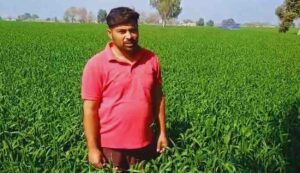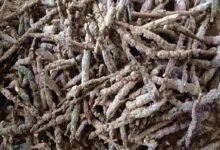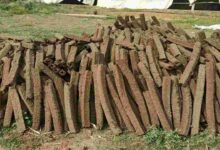Success Story: This young farmer of Punjab is earning a lot by cultivating this variety of Basmati rice.
Success Story: Vicky Gaba, a teenage farmer from Mamukheda village in Punjab’s Fazilka district, is gradually becoming known as a remarkable example of devotion to farming. Vicky has chosen a different path—to remain in his community and make farming both his livelihood and long-term focus—at a time when most people of his generation are moving from rural areas in search of metropolitan jobs.

He has been actively engaged in agriculture for the past eight years, establishing a self-sufficient lifestyle and inspiring others in his community to see the promise of farming. Even while working toward his degree, Vicky handles his farm duties with a level of expertise and discipline that reflects years of experience.
His business has grown from a 10-acre family estate to about 35 to 37 acres. Growing rice, especially the PB-1121 (Pusa Basmati) variety, during the Kharif season is a vital part of his work due to its high yield and market price. Paddy is a major component of his agricultural activities, which, together with animal husbandry, earn him around Rs 25 million annually.
Farming Traditions with a Contemporary Perspective
The family from which Vicky Gaba comes has been farming for several generations. It was only eight years ago that he started managing farms professionally. He went beyond traditional methods and adopted new seed varieties, scientific farming methods, and contemporary processes. He rears and maintains ten indigenous cows and buffaloes. He uses the organic manure from these animals in his farms to maintain soil fertility and partially reduce input costs.
Pusa Basmati 1121 (PB-1121): Revolutionary Variety
The improved rice variety PB-1121 (Pusa Basmati 1121) created by Shaktivardhak Hybrid Seeds has been the most important contributor to Vicky’s success. The variety is famous for both its excellent production potential and its long, aromatic grains. According to Vicky, he prepares the nursery using about 4 kg of seeds per acre. Vicky completes harvesting after transplanting by the first week of November, which coincides with the first week of July.
The biggest advantage of this variety is its stable market demand, which guarantees competitive pricing. He usually gets 20–24 quintals of production per acre, and under favorable market conditions, he has sold it for up to Rs. 4000 per quintal.
Various farming methods for long-term profits
Vicky also grows fodder crops, wheat and cotton, apart from rice. About ten years ago, he switched from cotton to rice, considering the losses from pink bollworm infestation and volatile market prices. He now grows 30 acres of PB-1121, 5 acres of cotton, and 2 acres of fodder during the Kharif season. Wheat dominates his fields during the Rabi season.
In addition, Vicky looks after a small dairy farm with ten indigenous buffaloes and cows. To improve soil health and save input costs, he uses cow dung as organic manure in his fields.
Smart cost control and planning
Vicky’s success is no coincidence; it is the result of careful preparation and effective resource allocation. His input cost for growing PB-1121, which includes labor, seeds, fertilisers and pesticides, comes to around Rs. 35,000 per acre. However, his profits far outweigh the costs due to Shaktivardhak’s excellent seeds and the technical support provided by the firm.
He can get up to 22 quintals of wheat per acre at an input cost of around Rs 10,000. Both crops contribute significantly to his annual income when prices and yields are favorable. A key component of his agricultural adventure is the support he receives from the Shaktivardhak Seeds team, which includes frequent field visits and informative guidance.
The power of youth and innovation
Vicky Gaba believes that agriculture must embrace innovation. According to him, modern farming requires smart planning, better technology and improved varieties. He said that instead of being afraid of change, farmers should embrace it and move forward. He believes that if a farmer is aware and works in a systematic way, he can earn thousands of rupees every year.
Vicky Gaba’s story reminds us that farming is not a backup plan. It can be a sure path to achievement. By combining his traditional heritage with a forward-thinking approach, he has developed a farming strategy that is sustainable and profitable. He is an inspiration not only to the farmers of Punjab but to all the youth of rural India. His farm is producing food grains as well as hope.

